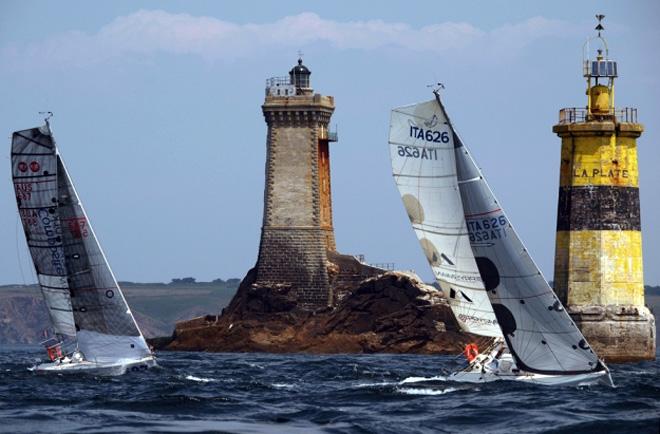Mini Transat - A magnetic challenge whose success cannot be denied
by Solene Rennuit on 19 Sep 2013

Mini Transat Jacques Vapillon
www.vapillon.com
To understand the renewed success of each edition of the Mini Transat we must consider the principles that led to its destiny, principles that are jealously guarded by the membership to protect the integrity of the Mini Class. The Mini Transat is not only an offshore race; it is also the story of a journey of initiation, strong human relations, improbable encounters between men and women from different backgrounds.
Let's face it: it's a funny idea to want, in the age of widely available Internet, satellite links and instant communication, to undertake a Transatlantic crossing with your means of communication limited to the absolute essentials in a tiny boat of 6.50 m. And yet, for every edition, there are more than a hundred wanting to try their luck. The young offshore sailor hoping to make the Mini Transat a step towards a career in sailing, the hobbyist for whom getting to the other side of the Atlantic is the Holy Grail, all can be found embedded in this funny common history that is the Mini Transat.
To understand, you have to imagine the daily life of a Mini Transat competitor. Reduced to its simplest expression it is about running a boat, planning for the coming days navigation and weather, eating succinctly, sleeping where you can, all in an incredibly cramped space. When the weather conditions are rough, it becomes increasingly difficult to find something dry and it is not uncommon for the most comfortable place to sit to be a corner of the cockpit. But life aboard a Mini is not a hell. Just to hear the talk about surfing under spinnaker in the sunny trade winds is to understand that, on those days, there are few better places in the world for a sailor to be than racing the Mini Transat.
Since its creation, the Mini Transat has always wanted to focus on the role of man in the conduct of his boat. Today, the sailors of the Mini Transat are entitled to use GPS and to receive limited information (wind speed and direction in particular). But though they no longer need to use the sextant for positioning, they are still cut off from any possibility of exchanging information with the outside world.
There is no question of being able to speak to someone to lift the mood on a difficult day, or seek the help of a team on the ground to solve a technical problem. The rule is inviolable: Help yourself and the Mini will help you. Michel Desjoyeaux, double winner of the Vendée Globe, admits himself that he did much introspective thinking during his Mini Transat in 1991.
Therefore, do not be surprised if some start logbooks of raw intimacy, rave to the cameras about their capabilities to reach the finish line, or are moved from tears to laughter in a few inverse seconds. The Mini Transat is an accelerator of emotions, one of the best opportunities to be alone with yourself.
It is therefore not surprising if, among all those who have raced the Mini Transat, there is a collusion that often manifests itself many years later. From Jean-Luc Van Den Heede via the Peyron brothers and through Halvard Mabire, Thomas Coville and Yves Le Blévec, all experienced those special hours that remain etched in life. Between all those sailors, there is a common bond, built up over the many editions of what remains one of the finest human adventures in the world of sailing. More than ever the watchword remains relevant for all those who dream of sea adventures: first pass your Mini.
The course 2013: returns to its origins
Leg 1 - Douarnenez to Puerto Calero (Lanzarote): 1257 miles.
Leg 2 - Puerto Calero to Pointe-à-Pitre: 2764 miles.
Dates
Prologue 'Tout commence en Finistère' October 6, 2013.
Start from Douarnenez October 13, 2013 at 13h. Arrival in the Canary Islands between 23 and 26 October 2013.
Start from Canary Islands November 9, 2013. Arrival in Guadeloupe between 23 and 30 November 2013.
All associations have mobilized Douarnenez with the support of local and regional authorities under the aegis of Douarnenez Courses: the yacht clubs, Douarnenez and Société des Régates de Douarnenez, the Winches club organizers for many years of Mini races with the Mini Fastnet and Trophy Marie-Agnès Péron as torchbearers, but also the association of the Fêtes Maritimes, the Atlantic Yacht Club, the Fédération Maritime and others who are preparing for fifteen days prior to departure, a festival celebrating the sea and the sailors. Competitors will be welcomed into the Port-Rhu a real jewel in the heart of the Mini Transat website
If you want to link to this article then please use this URL: www.sail-world.com/114651